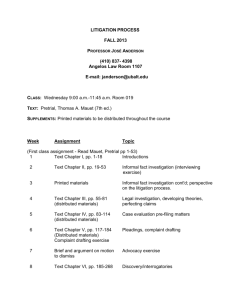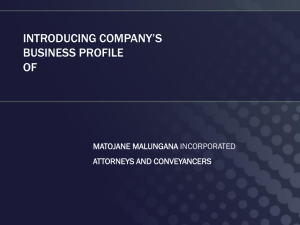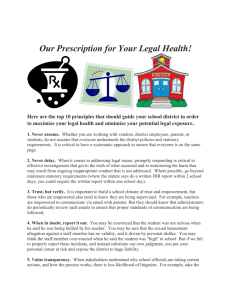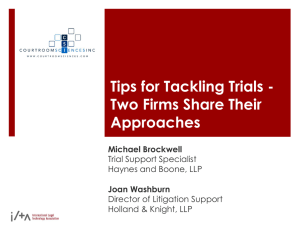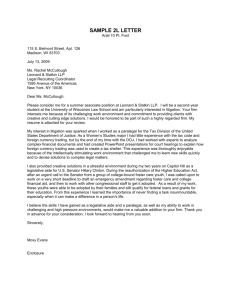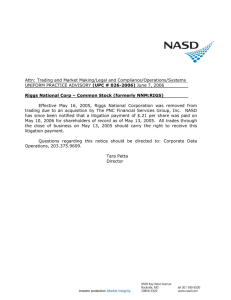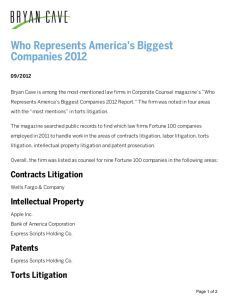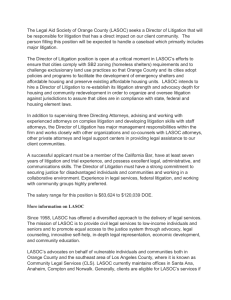Legal Job Descriptions & Practice Areas
advertisement
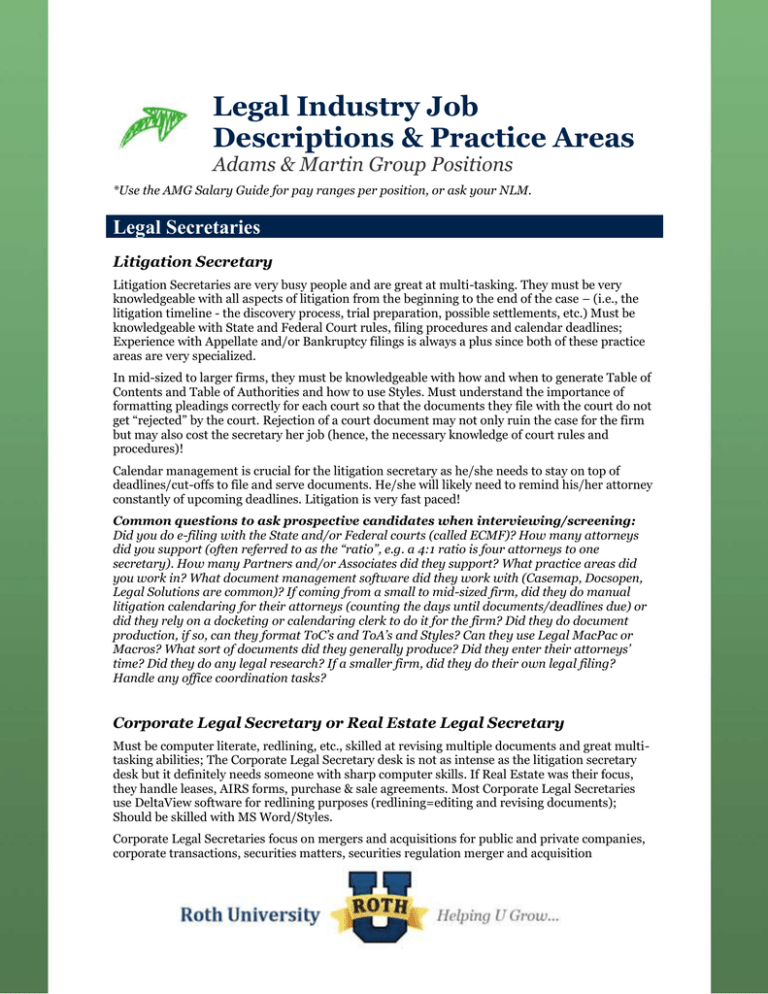
Legal Industry Job Descriptions & Practice Areas Adams & Martin Group Positions *Use the AMG Salary Guide for pay ranges per position, or ask your NLM. Legal Secretaries Litigation Secretary Litigation Secretaries are very busy people and are great at multi-tasking. They must be very knowledgeable with all aspects of litigation from the beginning to the end of the case – (i.e., the litigation timeline - the discovery process, trial preparation, possible settlements, etc.) Must be knowledgeable with State and Federal Court rules, filing procedures and calendar deadlines; Experience with Appellate and/or Bankruptcy filings is always a plus since both of these practice areas are very specialized. In mid-sized to larger firms, they must be knowledgeable with how and when to generate Table of Contents and Table of Authorities and how to use Styles. Must understand the importance of formatting pleadings correctly for each court so that the documents they file with the court do not get “rejected” by the court. Rejection of a court document may not only ruin the case for the firm but may also cost the secretary her job (hence, the necessary knowledge of court rules and procedures)! Calendar management is crucial for the litigation secretary as he/she needs to stay on top of deadlines/cut-offs to file and serve documents. He/she will likely need to remind his/her attorney constantly of upcoming deadlines. Litigation is very fast paced! Common questions to ask prospective candidates when interviewing/screening: Did you do e-filing with the State and/or Federal courts (called ECMF)? How many attorneys did you support (often referred to as the “ratio”, e.g. a 4:1 ratio is four attorneys to one secretary). How many Partners and/or Associates did they support? What practice areas did you work in? What document management software did they work with (Casemap, Docsopen, Legal Solutions are common)? If coming from a small to mid-sized firm, did they do manual litigation calendaring for their attorneys (counting the days until documents/deadlines due) or did they rely on a docketing or calendaring clerk to do it for the firm? Did they do document production, if so, can they format ToC’s and ToA’s and Styles? Can they use Legal MacPac or Macros? What sort of documents did they generally produce? Did they enter their attorneys’ time? Did they do any legal research? If a smaller firm, did they do their own legal filing? Handle any office coordination tasks? Corporate Legal Secretary or Real Estate Legal Secretary Must be computer literate, redlining, etc., skilled at revising multiple documents and great multitasking abilities; The Corporate Legal Secretary desk is not as intense as the litigation secretary desk but it definitely needs someone with sharp computer skills. If Real Estate was their focus, they handle leases, AIRS forms, purchase & sale agreements. Most Corporate Legal Secretaries use DeltaView software for redlining purposes (redlining=editing and revising documents); Should be skilled with MS Word/Styles. Corporate Legal Secretaries focus on mergers and acquisitions for public and private companies, corporate transactions, securities matters, securities regulation merger and acquisition transactions, equity and debt financing, corporate governance and operational matters, in addition to intellectual property for entertainment and entertainment-related fields; and; familiar with venture capital, bridge financing state and federal securities matters. Should be knowledgeable with UCC filings. Will also coordinate travel arrangements, meetings, take the minutes at Board of Directors meetings, etc. Common questions to ask prospective candidates when interviewing/screening: How many attorneys/executives did you support (attys if law firm, execs and attys if in-house)? What software did you use? Did you do document production and redlining? Experience in redlining in Deltaview or another software? What sorts of documents did you handle most frequently? If Real Estate was their focus, did they handle lease agreements, purchase & sale agreements and/or AIRS forms? Word Processor The Word Processor in a law firm is the Legal Secretary’s saving grace in deadline driven environments! The Word Processor is any legal secretary’s right hand person! Needless to say, this person must be very computer savvy, detail oriented, possess excellent proofreading skill and should understand the sense of urgency in revising/finalizing documents for the secretaries/attorneys. Must be knowledgeable with MS Word, WordPerfect, Styles, Redlining and dictation/transcription machines. Must be very knowledgeable with formatting pleadings and should know how to generate Table of Contents and Authorities (hereinafter “TOC/TOA”) using MS Word and/or WordPerfect. (TOC/TOAs must never be generated “manually” as this will completely mess up the document when revisions occur and it’s truly a nightmare! Anyone who says they generate TOC/TOAs manually is clearly not computer literate - this should be a red flag for the recruiter.) Common questions to ask prospective candidates when interviewing/screening: What versions of Word are you accustomed to working in? WordPerfect? Can you format ToC’s or ToA’s using macros? Can you format Styles? Have you used Legal MacPac? Redlining experience? *In larger firms, they have multiple Word Processing shifts to cover different offices. E.G. Gibson Dunn and Paul Hastings have graveyard, swing shifts etc. Important to ask candidates their openness to various shifts. Paralegals Litigation Paralegal Litigation Paralegals are very hands-on with their work. Should be familiar with all aspects of litigation, the discovery process (including subpoena preparation and propounding and responding to discovery), trial preparation procedures (including trial binders, preparing witnesses, etc.) Must have Summation and/or Concordance experience!!! Must be very organized, detailed oriented, logical thinker, multi-tasker , have strong computer skills in Word, Excel, Summation, Access and document management databases , and trial preparation experience. Four year degree and /or ABA paralegal certificate required (Business and Professions Code 6450). *Three phases for litigation: 1) discovery/pre-trial 2) trial 3) posttrial. Common questions to ask prospective candidates when interviewing/screening: Any trial experience? Have you only done trial prep or have you attended trial? If so, how many? What sorts of trials? Have you done drafting? Legal research? Discovery? Any case management software experience (e.g. in Concordance or Summation)? Any litigation support technology experience (e.g. in Livenote, Sanction, Ipro, Opticon etc.) Corporate Paralegal Corporate Paralegals focus on legal documents related to articles of incorporation and bylaws, stock certificates and other securities, UCC financing statements, closing documents for private transactions, stockholder annual meeting, corporate governance related matters for subsidiary board and stockholder, SEC registration statements (if public corporation) and periodic reports, subsidiary corporate minute books and corporate files, conduct legal research on state and federal law re corporations, LLC’s and securities law, etc. Corporate paralegals within law firms may do slightly different tasks than those within corporations but generally their skill set is transferable. Publicly traded corporations (e.g. Mattel) often require experience filing with the SEC. SEC filings often go by letters and numbers, e.g. Forms 4, 5, 6, D etc. Common questions to ask prospective candidates when interviewing/screening: Any familiarity with SEC forms? If so, which? Drafting contracts? Assembling Corporate Minute Books? Contracts Administrator Often shared skill set with Corporate Paralegals, but Contracts Administrators generally do just that, focus largely on Contracts. They will draft, revise and edit contracts and will also be responsible to maintain a contracts database on behalf of the corporation. Contracts can be vendor agreements, lease agreements, talent contracts, client agreements etc. (plus a number of other kinds). These types of positions are often found within entertainment firms or companies. Common questions to ask prospective candidates when interviewing/screening: Have you drafted contracts? Maintained a contracts database? If so, within what software? Redlining experience (in Deltaview or another program)? What type of contracts have you handled? Entertainment Paralegal Duties vary depending on the firm’s specialization in the entertainment field. For the most part the Entertainment Paralegal will focus on transactional entertainment, including theatrical motion pictures, television, animation, licensing, software development, new media and advertising and promotions. Paralegal will take the lead under the supervision of attorneys to negotiate and document development and production agreements and will assist with respect to financing, distribution, licensing and other transactions. Paralegal will create and maintain chain of title and transaction notebooks, check proposed credits, and interact with unions and guilds. Common questions to ask prospective candidates when interviewing/screening: Familiarity with UCC searches, music licensing and the SAG, DGA and WGA agreements is always a plus. Real Estate Paralegal Real Estate Paralegals duties will include review and analysis of title reports, underlying documents and surveys in connection with acquisitions, real estate finance transactions; conduct negotiations with title companies and surveyors re same; review and negotiate title insurance policies; prepare and file UCC Financing Statements in multiple jurisdictions; review and analysis of due diligence searches in connection with finance transactions; preparation of entity formation and authority documents, review and analysis of same; draft and review trust deeds, conveyance documents; bills of sale, assignments of leases, assignments of purchase agreements, amendments to purchase agreements, guaranties, and escrow instructions; review ground leases in connection with finance transactions; revise loan documents; conduct corporate due diligence and coordinate closings. Common questions to ask prospective candidates when interviewing/screening: Experience with Title and Survey, Closing documents, AIRS forms. Jr. Paralegal This is a position that typically does require 1-2 years experience within a law firm. Can be synonymous with Case Asst. Pulling cases from Westlaw, putting together hearing binders, conducting basic legal research, prepare and serve deposition notices and subpoenas, draft requests for admissions and productions, digest and analyze responses for discovery requests, prepare summaries of deposition transcripts, oversea doc production, and organize trial exhibits/binders/notebooks. Common questions to ask prospective candidates when interviewing/screening: Any work with discovery? Depo notices/subpoenas? Did you support senior paralegals or attorneys? Legal research experience? If so, in Lexis or Westlaw (or both)? Did you do any Bates stamping? Case Assistant The Case Assistant is a perfect position for someone who just obtained their paralegal certificate and is eager to get their foot in the door within a law firm. It’s a very junior position. Duties will likely include researching documents, preparing and organizing document production, including depositions and trial exhibits, distributing case materials to the litigation team, input and retrieval of information from document databases and assisting with trial preparation, i.e., witness/trial exhibits, key documents, bates labeling, filing, fed-ex-ing etc.; perform specially assigned projects as needed. Common questions to ask prospective candidates when interviewing/screening: Any work with discovery? Depo notices/subpoenas? Did you support senior paralegals or attorneys? Legal research experience? If so, in Lexis or Westlaw (or both)? Did you do any Bates stamping? Office Support Document Clerk Assists attorneys, paralegal and secretaries with bates labeling, production of documents, redaction of documents, sorting through files, etc. Common questions to ask prospective candidates when interviewing/screening: Did you do legal filing? Any legal research experience? If so, in Lexis or Westlaw (or both)? Did you do any Bates stamping? Any particular software for document/records management? Docket/Calendar Clerk Some law firms may use docket clerks; basically this person is responsible for all the firm-wide calendaring (deadlines, discovery cut-off dates, motion cut-off dates, response due dates, trial schedules, etc.) Should be proficient with calendaring software programs such as ProLaw, Compulaw etc. Common questions to ask prospective candidates when interviewing/screening: Were you in charge of all of the litigation calendaring for the firm? Are you familiar with litigation deadlines? What docketing software did you use? Records/File Clerk The Records/File clerk is responsible for file maintenance and management. He/she is the go-to person when an attorney, paralegal or legal secretary needs to locate a document (usually on a rush basis). Hence, this person needs to be on top of the case files and be very organized as he/she must be able to locate documents that are usually misplaced by others. Additional duties include closing and preparing files for offsite storage, index litigation files (i.e., must know the difference between a pleading and a discovery document), inputting and retrieval of information from document databases. Often performs conflict checks on new matter memos to be opened and creates new file folders for attorneys and secretaries. Common questions to ask prospective candidates when interviewing/screening: Did you do legal filing? Did you do any Bates stamping? Any particular software for document/records management? Did you also do offsite storage? Reception/office services coverage? Offices Services Clerk Responsible for copying, faxing, scanning, sorting of documents and distributing mail, ordering supplies, etc. Often covers reception. Handles conference room scheduling. Common questions to ask prospective candidates when interviewing/screening: Did you handle reception coverage? Scanning and copying (if so, what software/machines used)? Receptionist (Legal) Receptionist is the director of first impressions so law firm receptionists are generally extremely well-spoken and professional. They can also be tasked with admin tasks while at the front desk (e.g. bates labeling, billing etc.) Assist with administrative duties in addition to being extremely professional on the phones. Can pinch hit in Office Services (setting up conference rooms etc.). Switchboard experience a plus (based upon firm size). Must have the ability to screen phone calls and act as “Gatekeeper” for busy attys and administrators. Common questions to ask prospective candidates when interviewing/screening: How many lines did you field? Was it a switchboard or multi-line phone? Do you remember the type of phone? Did you assist with records department or office services? Attorneys *NOTE: Attorney positions are not amongst our primary focus or “pick 6” job titles and should only be recruited for under special circumstances and upon approval by your NLM. Project or Contract Attorneys Project attorneys for the most part are needed to conduct extensive document review of complex cases; the review may be of actual physical files/documents and/or online research using various legal software programs such as Ringtail, Lexis Nexis, Westlaw, etc. Common questions to ask prospective candidates when interviewing/screening: What software packages did you use for electronic doc review? How many documents did you review per day? How large-scale (e.g. # of documents) were the projects you were on? Associate Attorneys Must be active member with California Bar (we should always check for their status on the CA bar website) and will deal with certain practice areas. Are judged by level of experience vis a vis number of years in practice (e.g. someone who passed the bar in 2007 would likely be considered a 5th year in 2012 based upon whether they worked that full duration after passing the bar). Associates will commonly support Partners and depending upon the size of the firm and practice area, can get more deposition and trial experience in some firms vs. others. Common questions to ask prospective candidates when interviewing/screening: What practice areas did you focus on? How many depositions have you taken/defended? Any first chair depo experience, second chair? Have they gone to trial? If so, 1 st or second chair? Have they argued motions in court? How much drafting experience do you have? Overall, how much substantive law and motion experience do you have? The questions you ask will relate to their years’ of experience and resume. It is not wise to attempt to recruit attorneys early in your training as a lot of your experience with legal recruiting first comes from recruiting support staff and eventually, to possibly recruit attorneys. Common Practice Areas To follow is a list of the most common practice areas we receive orders for. There are three major categories of law, Litigation, Transactional and Criminal. Generally speaking, transactional work involves contracts, purchases, corporate organizational law or Real Estate matters. Generally speaking, litigation pertains to disputes between private parties, businesses or entities. Within Litigation are subsets, Civil Litigation and Business Litigation are the main categories encompassing many specific practice areas beneath them. Criminal pertains to any litigation in which a crime has taken place. White Collar criminal pertains to business crimes regarding executive criminal activity (e.g. Bernie Madoff’s Ponzi scheme) Litigation Within all litigation there is a plaintiff and a defendant. The Defendant is the one being accused, the Plaintiff is the accuser or the one with a complaint. Personal Injury (Plaintiff-side or Defense), AKA “PI”. If plaintiff, they represent the injured party. If Defense, they represent the other party being sued by the injured party. Intellectual Property, AKA “IP” IP Litigation- handles copyright, patent and/or trademark disputes between companies. Patent Prosecution (W/in U.S. files w/ USPTO, outside with WIPO)- prosecutes patents on behalf of companies in a dispute. Trademark Prosecution (files with TTAB)- prosecutes patents on behalf of companies in a dispute. Medical Malpractice, AKA “Med Mal” Represents doctors or hospitals against claims by patients. Professional Malpractice Can include Lawyers or other professions accused of malpractice (poor performance) Insurance Defense Defends insurance carriers against carriers with a spurious claim for insurance. Bankruptcy (Chapters 7, 13 etc. most commonly known) Creditor- represents a company/bank seeking payment from a debtor Debtor- represents individuals/company filing for bankruptcy Elder Abuse Generally involves elderly people in disputes with managed care providers or rest homes. Securities Litigation Involves broker dealers and investment firms in disputes regarding investment products that include securities. Real Estate Litigation Deals with Unlawful Detainer, Foreclosure and/or property disputes. Can be tied to Mortgage Litigation. Land Use Litigation Pertains to laws and regulations regarding the usage of land in development and or certain zoning requirements. Related to Real Estate Litigation and Environmental Litigation. Environmental Litigation Relates to regulations that pertain to development of land, zoning requirements and primarily to govt. statutes/regulations that vary by state to protect the environment. Could also relate to toxic tort if a company is disposing of hazardous waste inappropriately. Relates to Real Estate Litigation and Land Use law as well. In CA, often involves CEQA or CERCLA laws and regulations. Construction Defect Relates to issues with poorly constructed buildings with “defects” (homes or commercial properties). Can be a resident or business suing a contractor or homebuilder. Toxic Tort Common examples ore: Asbestos, Mesothelioma, Mold. Cases that have to do with a toxic substance poisoning people either as a result of prolonged exposure through the workplace (e.g. Waters & Kraus represents a lot of dockworkers and warehouse workers). Entertainment Litigation Can include work related to contract disputes, intellectual property matters pertaining to their trademarked creative work product, libel claims with tabloids etc. Sometimes can represent entertainers in their personal matters (divorces, custody battles). Labor & Employment Pertains to wrongful termination, wage & hour and/or discrimination (age, gender etc.) and/or contract disputes between employee and employer. Family Law Relates to divorce, custody battles and occasionally ties into family trusts. Relates to Trust & Estate/Probate work. Trusts & Estates/Probate Pertains to laws that relate to the size of the deceased’s estate and certain death taxes or estate taxes that apply. Can tie into Family Law- esp. if there is a trust. White Collar Criminal Often pertains to executives accused of securities fraud (can also be Securities Litigation), Ponzi schemes, embezzlement of corporate funds etc. Maritime law Pertains to laws that relate to national/international shipping and ocean travel laws relating to oceanfaring vessels or possibly offshore structures (oil platforms- also related to environmental law if spill). Many firms in Long Beach, CA handle this (e.g. Keesal Young & Logan) Workers Compensation Workers Comp Defense (defending the employer) Workers Comp Applicant (defending the worker with a claim) Corporate/Transactional Corporate- pertains to corporate contracts Real Estate- pertains to Real Estate matters regarding purchase & sale of property and leases. Entertainment- pertains to contracts, royalties etc. Labor & Employment (more often this practice area falls under litigation, can be transactional if working with labor contracts)
